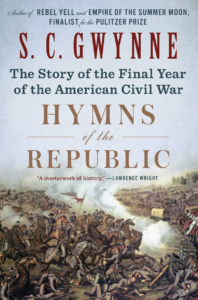


Hymns of the Republic: The Story of the Final Year of the American Civil War
By Samuel C. Gwynne (Scribner Press, 2019, 325 pages)

A couple of years ago I was given Rebel Yell, a new biography on Stonewall Jackson that was very highly regarded. I set it aside, having read Bud Robertson’s definitive biography on Jackson. The author, S.C. Gwynne, had been a finalist for the Pulitzer Prize for another book of his I have but not yet read—Empire of the Summer Moon, about the Comanche and their Chief Quannah Parker. Interestingly enough, in collecting the donated books from one of our deceased members, this book was on the top of the first box I opened, so I put it in my book bag and took it home. Knowing I would finish another book on a trip, I took this to read on the flight. I am glad I did.
Normally, I read three or four books at once until one hits a critical mass or becomes so interesting I cannot set it aside. That happened when I picked up Hymns of the Republic.
The book reminds me of the style of Shelby Foote in his Civil War three-volume set. Gwynne is a skilled storyteller who likes to muse on themes and write them out until he is ready to move to another theme. This is effective, and the book reads like a Reader’s Digest Condensed Book series from the fifties and sixties. There are a lot of themes, and thus a lot to chew on. Gwynne sets his mission to be “The Story of the Last Year of the American Civil War.” To that objective, he has done a credible job, although if to be literature, I prefer Bruce Catton’s A Stillness at Appomattox.
I enjoyed the book. It is a good read, but as a “historian,” I am disappointed in the methodology of this historian. He endnotes his book, but a review of that documentation shows he has depended heavily on the writings of other, mostly contemporary, historians and has footnoted their interpretations as influencing his interpretations, whereas those interpretations may or may not have come from primary sources. We see familiar names, and he does note where men and women of the times perhaps have a reputation for exaggeration, but I was hardpressed to find any clear interpretive conclusions drawn from his own primary research. It looks much like a compendium of a wide range of recent scholarship. One example will suffice.
In discussing the compelling story of the surrender, Gwynne challenges the conventional interpretation of the ceremony, one that would certainly cause historians and traditionalists to sit up straight in their chairs. I then saw an asterisk and looked to the bottom of the page to see: “The best researched debunking of the various Appomattox myths is to be found in William Marvel’s definitive Lee’s Last Retreat: The Flight to Appomattox. I have generally followed his approach in this section.” The footnotes in the section all track to Marvel’s narrative. The National Park Service and nationally respected historian from Petersburg and the final campaigns, Chris Calkins, and his works are not cited. I find that a serious blow to accepting this as a work of scholarship.
Having established what this isn’t, it is relatively easy to accept it for what is is: A very fine piece of narrative. He does make everyone think, factual errors are minimal, and there is something for everyone who reads it. I found his analysis of Sherman to be credible. His evaluation of Sheridan is fair and well stated. The story of Fort Pillow is gripping even if I did not necessarily agree with all of his conclusions. His treatment of Clara Barton does the woman justice. I found that his telling of the background and efforts to unseat Lincoln in 1864, especially within his own party, was a pleasant interlude. As I think you can tell, I was pleased with these various mini-themes. Gwynne’s narrative is not chronological; thus, his subtitle would have been better stated as “Personal Reflections on the Final Year of America’s Civil War.”
So why three stars? A fair rating for what we have been given. The narrative and themes are excellent—both diverse and substantial. Each theme is of such length as to let the reader into the moment and yet not too much to suggest an academic treatment. Historians and Civil War buffs will find themselves checking sources and mentally inserting what they know about the theme as they progress through Gwynne’s narrative. Casual readers, which are clearly the target of a book put out by a popular press, may find this the only or first reading they have ever done on the subject, and so for them this book is generally excellent. On my scale, he couldn’t get a five-star rating, as I have never given one. Four was a reasonable starting point, but the shallowness of the sources and his assimilation and retelling of others’ works (giving credit where it was due rather than footnoting the components of a new finding) cost him a full point. I wanted to go to 2.5 stars, but the read was just too good. He did win out over three other books I was reading at the time, so three it is!
I will read his Stonewall Jackson book because I like the way he writes, and I will read the Comanche book on Quannah Parker because of the legend. You will not be disappointed if you read this book.
–Len Riedel
BGES Executive Director
You must be logged in to post a comment.